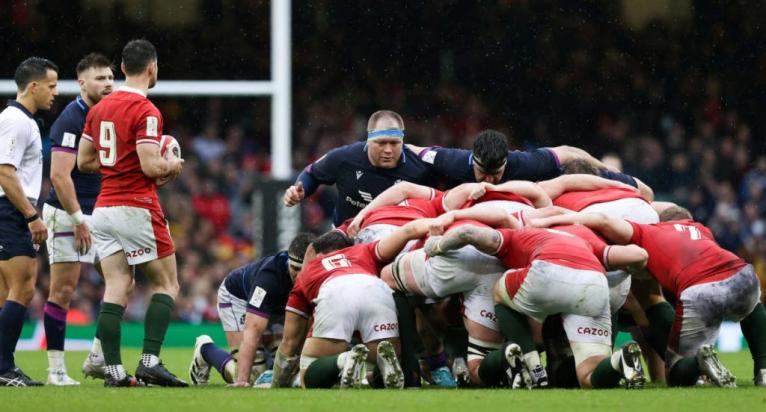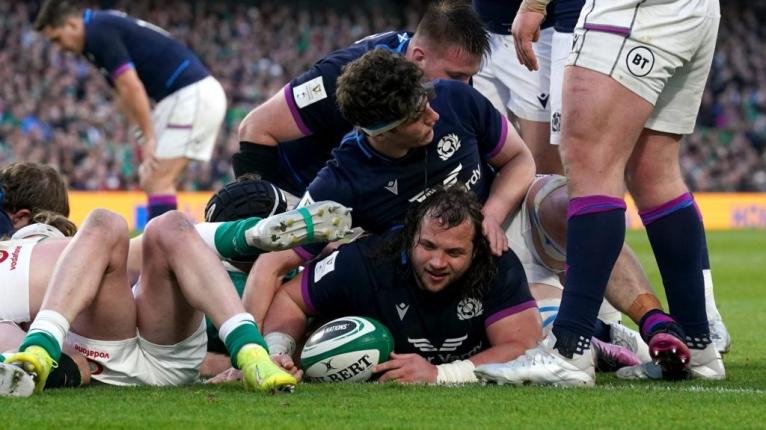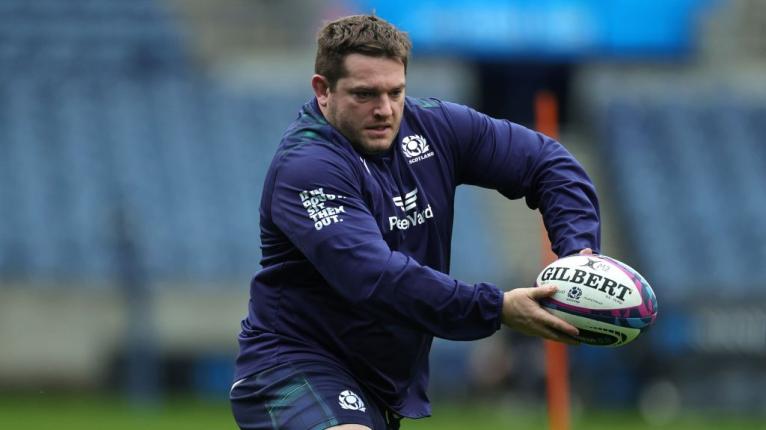You couldn’t fail to be moved by the scenes at DHL Stadium last Saturday, WP Nel striding down the tunnel flanked by his four children, celebrating a double century of Edinburgh matches back where his professional career began over 15 years earlier.
Nel’s retirement at the end of the season feels like the end of an era. His time in Scotland has spanned over 200 club games, six head coaches, more than 60 Scotland caps and three Rugby World Cups. The humble Afrikaner has given so much to the Scottish scene. He bled for the jerseys of club and country, quietly pulverising looseheads, setting standards and bringing a brilliantly dry wit to those with whom he shared the arena. He fetched up a dozen years ago, shy and reluctant to speak English, and retires, at 38, with a few more kids and Scotland etched into his very being.
What will Nel’s legacy be, beyond the opponents concertinaed and the tries gobbled up? Privately, he is believed to have expressed concern at the dearth of young Scots vying to snatch his place. That’s why, even as his years advanced, Scotland have placed such heavy reliance on Nel backing up Zander Fagerson as the nation’s scrum anchor. To whom, now, is the old bull handing on the baton?

A lot of incendiary takes do the rounds at this time of year, figures about birthplaces and nationalities and little flags next to surnames whipping up a frenzy on social media. Scotland features prominently in these discussions. You can picture the barbs: ‘What a broad Scottish accent Duhan van der Merwe has’… ‘It’s South Africa’s B team!’… ‘Where are all the actual Scots?!’
Nuance is lost in the noise. It is simultaneously true that Scotland should supplement its modest player pool with overseas recruits, but that the paucity of players progressing to international rugby from its domestic pathway is troubling. It’s not about maligning the ‘foreigners’ who commit to their adopted nation; it’s about Scotland addressing its deficiencies in bringing through local talent to the top level. And more than anywhere else, those deficiencies are plain in the prop department.
Since Nel debuted in 2015, fourteen props have been capped by Scotland. Six of those are products of the Scottish Rugby system, and only two – Rory Sutherland and Fagerson – have become mainstays of the national pack.
Like Nel, Pierre Schoeman, Oli Kebble and Allan Dell were South Africa-born and bred. Simon Berghan was raised in New Zealand; Darryl Marfo, England and Javan Sebastian, Wales. This season, Will Hurd (England) was in the wider Six Nations squad while Alec Hepburn, an Australia-born former England loosehead, and Elliot Millar-Mills, also reared south of the border, took their first laudable steps in the navy jersey.
Let’s get one thing straight: these men unequivocally deserve to wear the shirt. Only a fool would question their credentials, desire or application to do so. One’s national identity is a complex and fluid concept and most of the players namechecked have deep-rooted family ties to Scotland.
WP Nel has been asked to pony up again and again, adapted his body, shed excess weight and gone to the well to stay competitive in this rarified air. Whatever is said about World Rugby’s residency laws, you can’t question Nel’s unerring commitment to the Saltire.
Take Andy Christie, for instance, the flanker born in England to a Nigerian father and mother who is a second-generation Scot. Christie had this to say to RugbyPass last week on his national makeup: “The part I find most interesting is when people tell me that I’m English. I don’t know who gets to decide that for me but I know it’s not random people on X [Twitter]. I have heritage from all over the place. I’ve never fully identified as English because I’m so much more than that. So when people tell me that I’m not properly Scottish, or that I am English, I always ask, ‘Am I?’.”
Nel has no such link to Scotland, yet his interviews last week were profoundly moving. All those years and all those matches and all those family memories. A faltering voice and a glassy eye.
Were it not for injury, Nel would have sat on the bench for Fagerson this Six Nations as he enters the final two years of his thirties. He has been asked to pony up again and again, adapted his body, shed excess weight and gone to the well to stay competitive in this rarified air. Whatever is said about World Rugby’s residency laws, you can’t question Nel’s unerring commitment to the Saltire.
His time is done, and there’s an alarming lack of tyros chapping at Gregor Townsend’s door to replace him. Behind Fagerson, there are virtually no home-grown alternatives which is why most of Scotland breaks out in hives when the enormous tight-head takes a knee. Murphy Walker is the next cab off the Scottish rank but has been out since the summer with calf and knee injuries. He has three caps as a replacement but at 24 years old, played only a dozen games and 500 minutes for Glasgow.

Even at club level, the situation is stark. As well as Schoeman and Nel, Edinburgh have South Africans Boan Venter and Luan de Bruin on the books, plus Scottish-qualified New Zealander Angus Williams. Sometimes all four Edinburgh props in a matchday squad are South Africa-born. Neither Robin Hislop nor D’Arcy Rae, signed over the summer, have featured much owing to injury. There will be movement over pre-season but rather than promote an obvious burgeoning Scot, England international Paul Hill is expected to take Nel’s berth.
Glasgow have Kebble and Nathan McBeth, another Scottish-qualified but South Africa-born loosehead, as well as Argentines Lucio Sordoni and Enrique Pieretto. They have Walker, the impressive Jamie Bhatti and brought Sutherland back from Oyonnax for next season, but also agreed a deal for Exeter’s eye-catching Namibian Pat Schickerling.
Beneath them, giant tighthead Callum Norrie is now a veteran of three Under-20s campaigns and needs senior minutes to bring his game to the next level. He has had no opportunity to play a competitive professional match but those whose opinions matter reckon he could follow in Fagerson’s bootprints.
At 20, Norrie has time on his side. Yet opportunities can be hard to come by in a well-resourced two-team professional setup. Sean Everitt and Franco Smith have shown willingness to give youngsters their shot, but the coaches are also under substantial pressure to drive their international-laden squads towards silverware. The competing demands of running a Scottish club seldom exist in neat equilibrium.
Uini Atonios do not grow on trees in Kelvingrove Park, but Scotland’s rivals have generally managed to make more of what’s on their doorstep.
Why do Scotland struggle to produce props of their own? The nation has generally specialised in light, mobile, technically excellent scrummagers, all the way back to Ian ‘Mighty Mouse’ McLauchlan whose snarling truculence on the Lions tours of the 1970s are the stuff of folklore. David Sole was no modern-day leviathan, but a terrific player and captain who led Scotland to what remains their most recent Slam in 1990. Tom Smith was the prototype for the props of today with his footballing acumen and exceptional set-piece skill which bamboozled many larger opponents. Al Dickinson had the pace of a back-row and worked hard to become an international-class scrummager.
There were outliers from that trend, sure. Allan ‘Chunk’ Jacobsen clearly did not lack bulk but was also a skilled ball player. Over the past twenty years, Euan Murray is probably the only home-grown Scot whose sheer muscularity put him on par with any prop in the world. Murray famously dismantled Beast Mtawarira in an autumn international, but despite his 66-cap haul, injuries and his refusal to compromise his faith by playing on Sundays left Scottish folk pining for more.
As a rule, the Celtic nations don’t breed beefcakes like the South Africans, the French or Pacific Islanders. Uini Atonios do not grow on trees in Kelvingrove Park. But Scotland’s rivals have generally managed to make more of what’s on their doorstep. In Tadhg Furlong and Andrew Porter, Ireland have two of the world’s finest and a flourishing school system to keep the churn flowing. Jack Boyle of Leinster looks to have Test-match potential. Scott Wilson, a Ravenhill season ticket holder as a boy, steadied a crumbling Ulster scrum against Ox Nche in Durban a fortnight ago.
With a handful of exceptions from across the Severn, Wales did not need an influx of overseas heft to win the championships which continue to elude Scotland. England have tended to plump for the now rather than the future, in choosing Joe Marler and Dan Cole, but their player pool is unrivalled anywhere in the sport. France, too, have behemoths by the truckload. Italy’s production line is a model Scotland should look to for inspiration; it has polished up a steady spree of propping gems thanks to the streamlining of the national academy systems. Danilo Fischetti, Giosue Zilocchi, Marco Riccioni and Luca Rizzoli are recent and compelling examples. None of these countries seem to have the same prop shortage as Scotland; nowhere else across the Six Nations is this pressure so keenly felt.

Scottish Rugby is not blind to the deficit, hence the launch of ‘Scrum School’ last year, an initiative aimed to attract and nurture front-rowers and those coaching them. When the programme was unveiled in January 2023, director of rugby development Gav Scott said: “It’s no secret teams across the country – both male and female – have been faced with issues in player availability in the front-row, and this can lead to games being postponed, delaying the progress of competition.”
Scrum School is a commendable strategy, but it’s one for the long term. Nel will be far gone by the time it bears tangible fruit. And so we bid farewell to a softly-spoken introvert who landed on these shores without a thread of tartan or a whiff of haggis about him, who moves on with Scotland pulsing through his veins and weaved through his family. Nel departs a giant of Scottish rugby, but his journey should be the exception rather than the rule, and overseas signings a supplement rather than substance. The quest for local heirs to his throne continues apace.



Comments
Join free and tell us what you really think!
Sign up for free